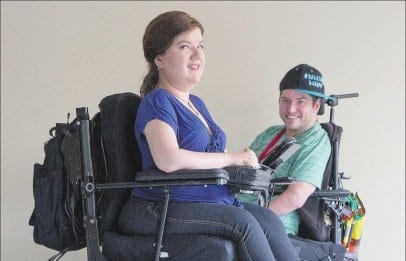Back in January, prolific American 20-something blogger Ryan O’Connell finally came out. Not as gay — that ship had long sailed — but as disabled.
“I’ve never written about the fact that I have cerebral palsy,” he wrote. “I used to justify this by saying it was too personal of a thing to share with trolls on the Internet. They would just comment ‘GO DIE IN A GIMP FIRE YOU GIMPY MOTHERFUCKER LOL JK FOLLOW ME BACK ON TWITTER????!!!!’ But the real reason why I hid it was because, well, I medium-hated myself and wasn’t ready to deal with it.”
But now, in his first book, I’m Special (And Other Lies We Tell Ourselves), O’Connell throws open all his closets with giddy and sometimes ruthless abandon. The book is one-part confessional, one-part social study, one-part self-help book and funny throughout. He’s as adorable on the page as he is in this video:
“I liked to think that I was special,” he writes, “for having a unique set of hardships (“I AM THE ONLY GAY GIMP TO EVER EXIST!”), but the fact is that every gay guy is reconciling how they should be in the eyes of society with how they really are. I’m a gay guy with cerebral palsy. So what? The line forms at the left with the gay guys who feel inadequate.” Realizing his own ordinariness, O’Connell writes, is “the one thing that released me from my neuroses and let me be truly happy.”

Perhaps most upfront is Huffington Post blogger and disability awareness consultant Andrew Morrison-Gurza, who’s written a series of terrific pieces on sex and disability (hey publishers, where’s his book?) and is now, in conjunction with Buddies in Bad Times Theatre and Oasis Aqualounge, hosting Canada’s first sex party for people of all body types and abilities in Toronto.
“What I am quickly learning through this experience of trying to organize something that celebrates people with disabilities and their sensuality,” he wrote in June 2015, “is that we as a society are fucking scared. We are utterly terrified of what this means, and we would rather make jokes about the all-night sex fest with the cripples to assuage our discomfort, than bother to look at it from another angle. Those of us with access to our bodies and/or the body of a partner, who haven’t even had to worry about when or if you’ll ever get laid again (or, for the first time), can make those jokes.”
What’s revolutionary about the work of Morrison-Gurza, Trace and O’Connell is the way those jokes are now flipped, with disabled bodies front and centre, with humour as a source of strength and growth, not easy mockery, and with differences being celebrated. Hopefully, that attitude will soon be ordinary instead of (sorry, Ryan!) something special.


 Why you can trust Xtra
Why you can trust Xtra


